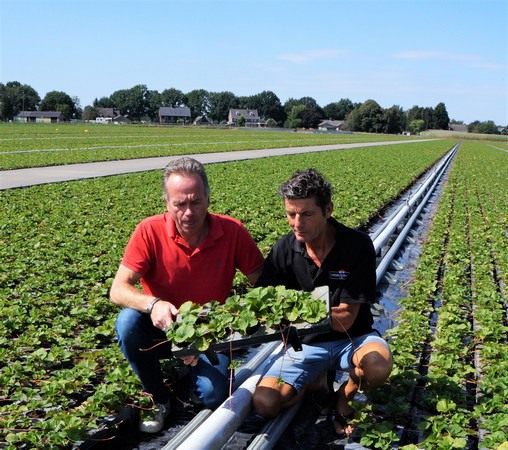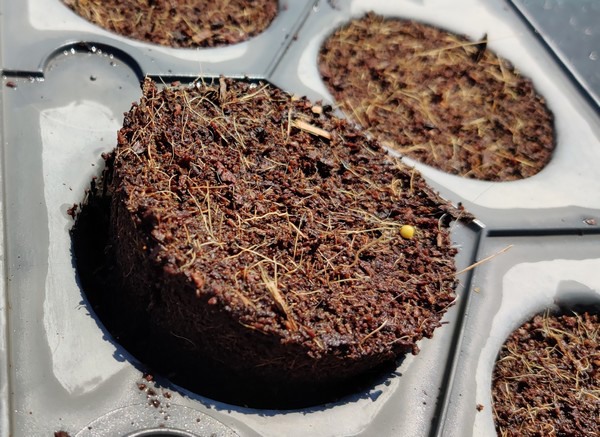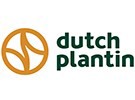There are hardly any areas in the world where coco producer and supplier Dutch Plantin does not deliver. Professional growers worldwide use the coco substrates for their soft fruit, vegetable and flower cultivation. But perhaps the most innovative customer is just around the corner.
Jan van den Elzen from Uden grows - which is unique - tray plants on one hundred percent pure coco. Plus he is the first end user to whom Dutch Plantin in the Netherlands supplies directly loose cocopeat. "A shorter line is not possible."

Bold choices
Growing tray plants on one hundred percent pure buffered coco. Few growers dare to do this. But Jan van den Elzen of Inti-Tray does. In the past, he made more daring choices that other growers would.
And with success. Jan was the largest greenhouse strawberry grower in the Netherlands for ten years, is one of the suppliers of the Malling Centenary strawberry plants for England and made national news in the Corona months with kilometers of traffic jams for the unique Strawberry Drive-in J&B.
Five million tray plants
Around 1990 barely any greenhouse strawberries were grown in the Netherlands. But it was precisely during that period that Jan decided to focus entirely on strawberries. “I borrowed a million guilders and bought a greenhouse. There were few growers with strawberries in the greenhouse. And even then the average of greenhouse strawberries was half a hectare, nothing more. I myself also had no experience with it, but I did have good feeling about strawberry cultivation.”
And he had guts. He not only built the highest strawberry greenhouse in the Netherlands, but also experimented with hanging cuttings under glass. “After some time I had a surplus. Then you can do two things: discard them or take cuttings. I took cutting outside and became a plant grower more or less by accident. We now have outside tray fields with five million plants. We supply these to other plant nurseries and strawberry growers in the Netherlands and the EU.”
“Outside using coco? Nobody else is doing that”
"Don't do more, but do it better." That is Jan's motto. This is also the basis for his choice of substrates made from 100% pure coco. At Inti-Tray, they have been growing strawberries in the greenhouse on pure coco for already about six years now. “But trayplants in the open air? Nobody else did that. “It has to be quite precise when it comes to irrigation and fertilization. But I once just did an experiment. I set a few trays aside. One hundred percent pure coco in it, no fertilizers and every now and then irrigation with a watering can.”

Minimal water consumption
You have to dare to grow on coco and have a feeling for it. “For our Malling Centenary, a super sensitive variety when it comes to root diseases, coco offers many advantages. We take cuttings from our tray plants in July and August. Then comes autumn, so we mainly propagate them in the wet months. Coco allows water to pass through more easily. And with your irrigation you can also regulate the water balance on and around the plant much better. The tray field is a closed system, we want to use as little water as possible. There is a future in that, the next fifty years we will need substrates very badly. Worldwide."
"There is no growth medium that is more sustainable"
It is not without reason that Dutch Plantin has been committed to convince growers worldwide for more than thirty years of the added value of coco as a raw material for the cultivation of vegetables, soft fruit, flowers and plants. “There is no growth medium that is more sustainable”, says Wim Roosen of Dutch Plantin, “Sustainability is high on political agendas worldwide. We are faced with stricter rules for the use of water and fertilizers. In contrast to irrigate the open field, the irrigation of coco substrates requires minimal water.
Moreover, they are closed systems, the fertilizer contained in them is partly released slowly. Good for cultivation and the environment, because nothing ends up in the soil. Plus: our substrates last for several seasons. Blueberry growers, for example, can use it for up to ten years.”
Lower CO2 emissions
Coco products offer many more benefits for the environment, Wim continues. For example, the grow bags, blocks and briquettes are made from the husk of coconuts, and are therefore more sustainable than other substrates.
In addition, coco substrate has a much lower CO2 emission. Wim: “And because we have the entire production process in-house, we can guarantee a process that is as sustainable as possible. In our production countries, we dry coco in the sun, without gas and oil heating. We wash the vast majority in the Netherlands, where water is less scarce, and we clean and recycle this water. By compressing the product in an innovative way, we can transport enormous quantities in one container.”
Unique order
The coco products that Dutch Plantin supplies to Inti-Tray form a unique order for the producer. “The coco market in soft fruit is on the move, and Jan is the first end user to buy our products directly from us. The fact that our companies in Boekel and Uden are less than a 10-minute drive distanced from each other makes it even more special. Our products fly all over the world. Now we can deliver them - so to speak - with the wheelbarrow. Isn't it great, how two international companies work together locally? A shorter line, literally and figuratively, is actually not possible.”
For more information:
Dutch Plantin
www.dutchplantin.com
Wim Roosen
[email protected]
